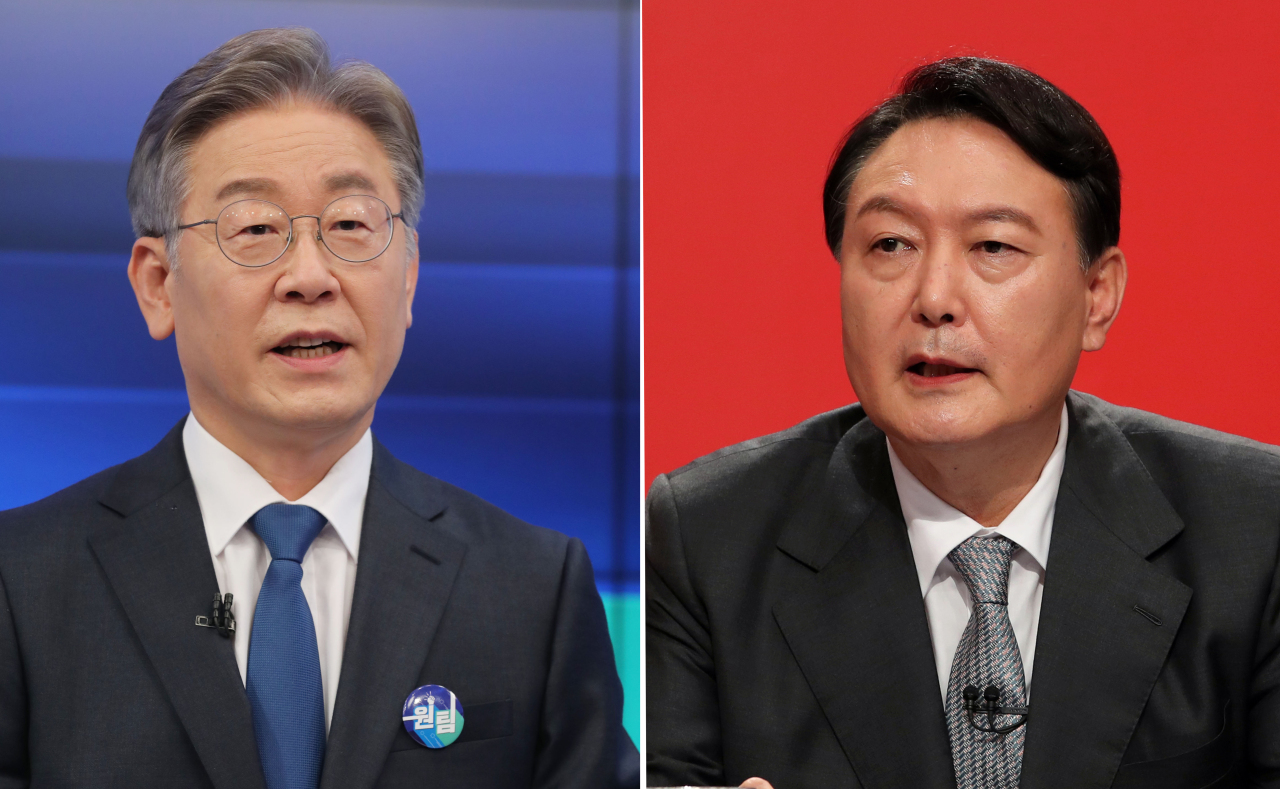 |
Democratic Party of Korea presidential candidate Lee Jae-myung (left) and People Power Party presidential candidate Yoon Seok-youl (Yonhap) |
The four-month presidential campaign has fully begun in earnest, but both the ruling and main opposition candidates face a series of hurdles ranging from a lack of appeal outside party supporters to allegations that could potentially bring them under the scrutiny of law enforcement.
For both the ruling Democratic Party of Korea’s Lee Jae-myung and main opposition People Power Party’s Yoon Seok-youl, winning over younger generations and female voters are critical tasks, amid unprecedentedly low public support for the contenders.
A recent Gallup poll identifies more than 30 percent of Koreans as swing voters. Although 57 percent of respondents said that the next presidential election should see regime change, it does not mean that Yoon would get that full support. The same pollster showed Yoon at 24 percent support while Lee sat at 26 percent.
For Democratic Party candidate Lee, winning back the hearts of young voters will prove critical. Young voters, who have traditionally favored the progressive bloc, have in recent years turned a cold shoulder to the ruling party over issues such as the Moon Jae-in administration’s employment and real estate policies, as well as the scandal surrounding former Justice Minister Cho Kuk.
Lee also needs to gain support from female voters, who have negatively evaluated him for abusive language toward his sister-in-law and an alleged affair with an actor. During the party’s primary, he lagged behind his rival, Lee Nak-yon, in women’s approval ratings.
Yoon also has not curried the favor of young people. Since Yoon beat Rep. Hong Joon-pyo, who fares better among younger voters, in the primary on Friday, there has been backlash from young party members who suggest they may leave the party that is now “only for the old.” Some disappointed young supporters sarcastically said they would vote for Lee and then leave Korea.
The biggest challenge for Yoon is how to absorb Hong’s support base and win the hearts of young people. Party leader Lee Joon-seok sought to dispel such concerns, saying Saturday, “I met Yoon several times and thought that he had the power to appeal to the younger generation. If we work in that direction, worries will disappear.”
Both candidates Lee and Yoon also need to resolve several allegations and scandals they have been mired in.
Lee is embroiled in suspicions over preferential treatment related to the property development of Daejang-dong in Seongnam, Gyeonggi Province. Yoo Dong-kyu, former head of Seongnam Urban Development Corp. and a close aide to Lee, has been arrested on allegations related to Daejang-dong. Lee’s closest aide Chung Jin-sang was found to have spoken to Yoo by phone right before authorities raided the latter’s home.
Yoon is also not free from judicial risks. He remains mired in alleged political meddling ahead of last year’s general elections. His mother-in-law and wife are also alleged to have been involved in criminal activities such as stock price manipulation. The ruling party has raised suspicions that Yoon covered the alleged bribery of former Yongsan Tax Office head Yoon woo-jin, brother of Yoon Dae-jin, who is a close aide to Yoon Seok-youl.
As the two struggling candidates are wrestling with allegations and low approval, unifying with other influential candidates has emerged as a vital answer. The ruling and opposition parties are courting former Deputy Prime Minister for Economic Affairs Kim Dong-yeon and People’s Party leader Ahn Cheol-soo, respectively.
Ahn declared his third bid for the presidency last week. When asked about the possibility of unification and solidarity with the People Power Party, Ahn refrained from answering directly, saying, “I have already told you that I would change the administration,” though he still hinted at the possibility.
The Democratic Party is courting independent candidate Kim. Party leader Song Young-gil met with Kim last week and mentioned the Korean four-character idiom “Eumsoosawon,” meaning not to forget the source. Kim served as the first deputy prime minister for economic affairs of the Moon Jae-in government.
By Shin Ji-hye (
shinjh@heraldcorp.com)







![[Robert Fouser] Accepting migrants in South Korea](http://res.heraldm.com/phpwas/restmb_idxmake.php?idx=644&simg=/content/image/2024/10/31/20241031050896_0.jpg)
